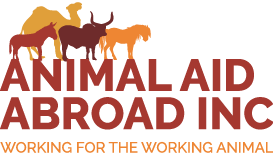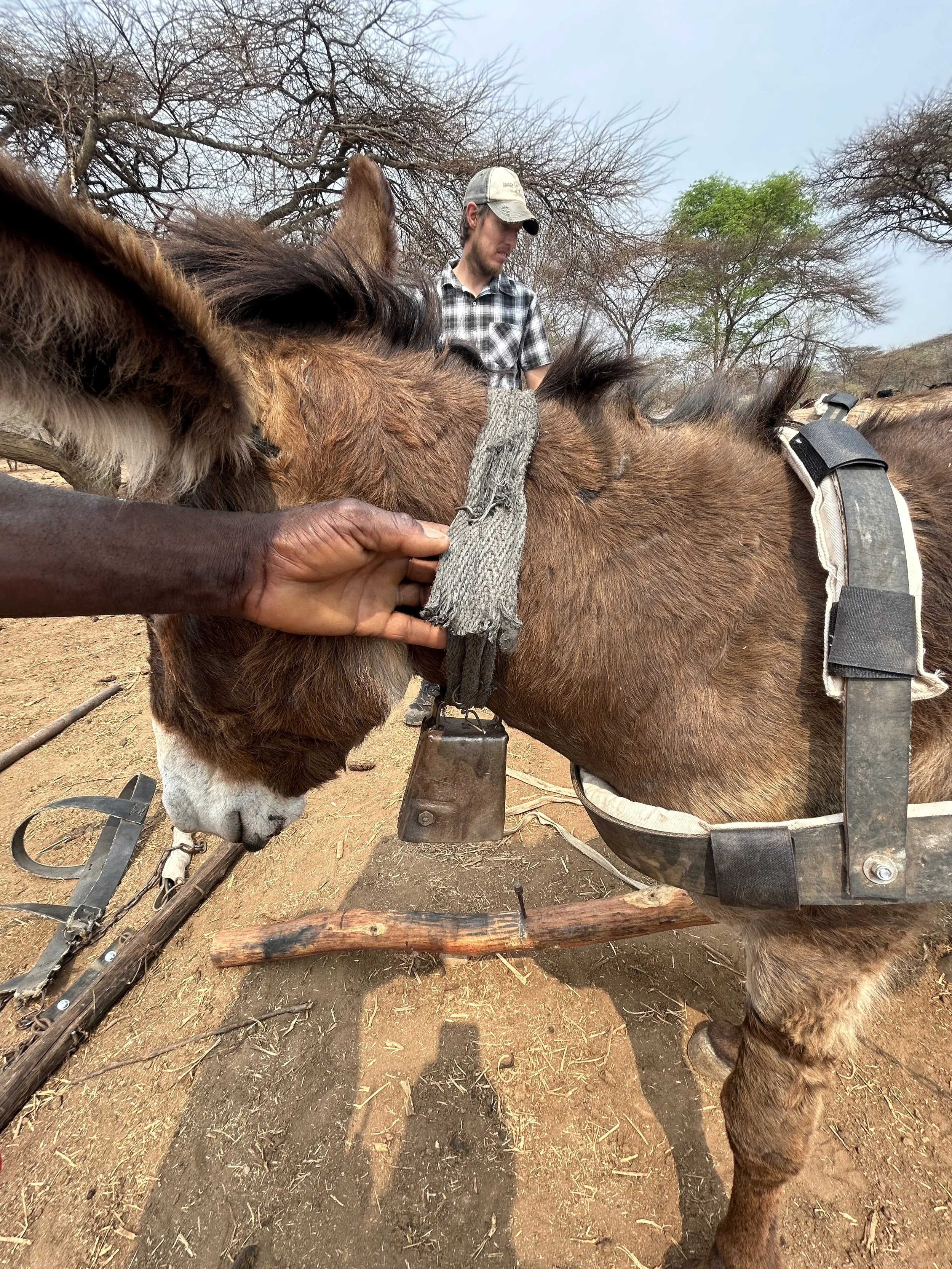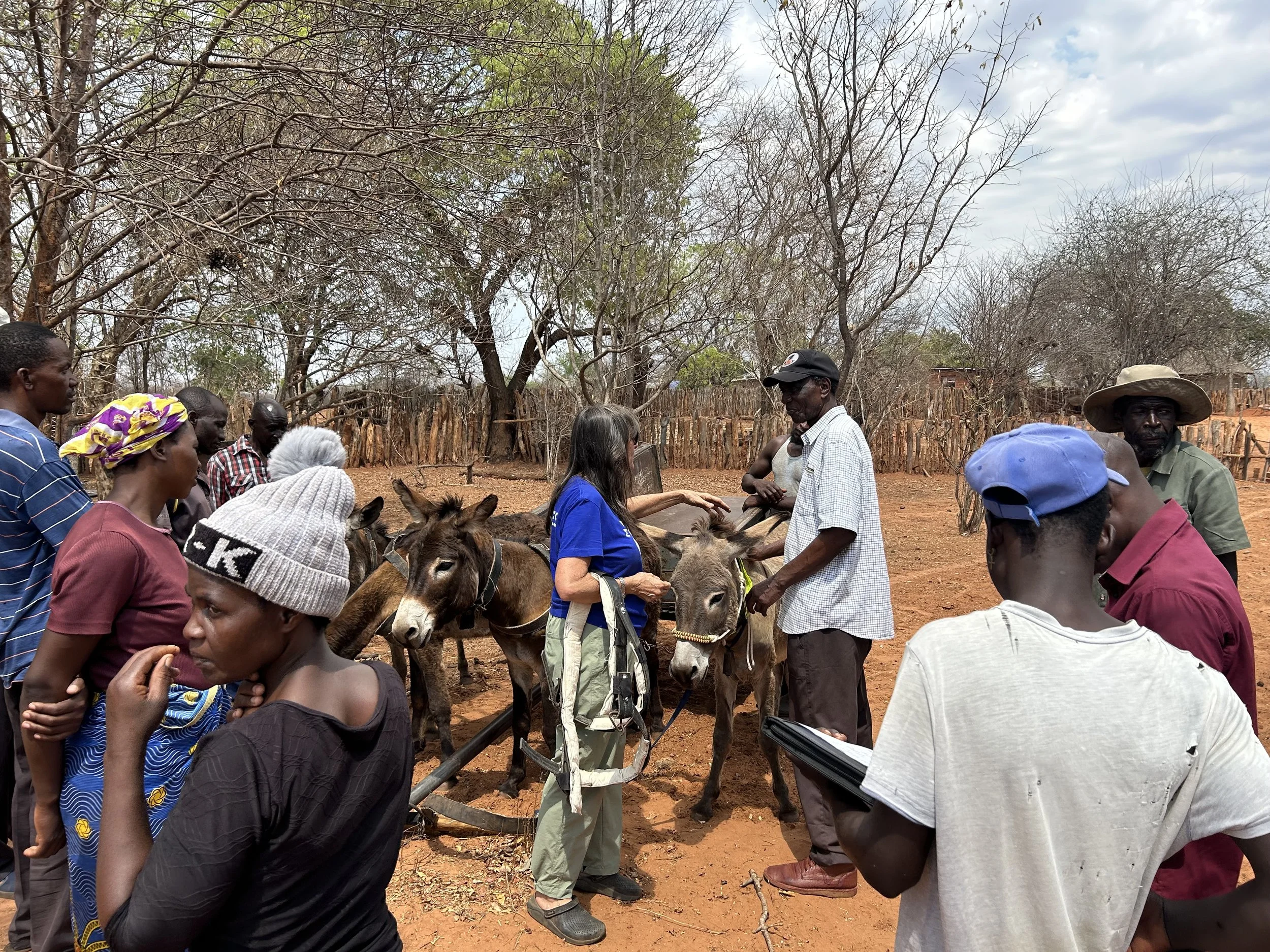Matabeleland Animal Rescue & Equine Sanctuary October 2023 Report
The Matabeleland Animal Rescue & Equine Sanctuary (MARES) are one of the hard-working partner groups that are supported by generous AAA donors. Following is a report on their October Outreach project.
MARES held the October donkey welfare outreach on the 16th and 17th of October, in Mabale, a community adjacent to the Hwange National Park area. The outreach venue was near the dip tank, at the place where Chief Neukomba Dingani of Hwange, has allocated land for the building of a community donkey welfare sanctuary. The outreach program entailed distribution of harnesses and fixing of scotch-carts, as well as watching the progression of our Animal Aid Abroad/Mares Donkey Feed & Rehabilitation Project. The team that conducted the workshop comprised Claire Einhorn (MARES Director), Mr. Chris Mackenzie, Administrator, Charles Ndhlovu (Harness Technician)
The team was met by the Soft Foot Alliance team at the dip-tank for the community donkey welfare awareness program. 20 families had their 20 scotch-carts done, meaning that 40 donkeys were fitted with humane padded harnesses, 80 bell straps which reduce damage caused by wire and injuries to the donkeys’ jaws when caught under the yoke. We also supplied 80 neck reflectors so that donkeys wandering on the road can be seen by motorists. It is most important this time of the year when the only grass available is along the side of the main roads due to dew runoff.
Sadly, we are still finding donkeys under the age of 3 years being used to pull the carts. We have had a meeting with Soft Foot Alliance overseer, Mr. Brett Staplekamp and Chief Dingani that if, after being educated, we find any donkey owner continuing to use underage donkeys in harness, the donkey will be confiscated and the owner charged under the Cruelty to Animals Act. The same will apply to the overloading of their scotch carts. (See pictures showing overloaded cart with firewood being pulled by a one year old donkey. As we say, there is so much education we can provide, if the owners wish to ignore the education then punishment is the next step. This is why we always work under the Chief or Headman of that area. We are happy to say that there were no major harness wounds. We treated an old donkey, over 24 years, with poor teeth and no appetite and instructed the owner to retire her donkey.
The second day (17 October, 2023), was spent inspecting the rehabilitation of the old water trough that had been out of action due to severe leaks. (Please see photos showing it repaired and the donkeys enjoying a cool drink from it). The solar panels were installed with the AC/DC borehole pump and a temporary fence was erected to secure the pump until our main fencing is completed. Soft Foot Alliance has commenced work on the building of the donkey stall and house for our new employee, who will oversee the care of any injured donkeys as well as watering and maintaining the moringa trees. It is taking a lot longer than anticipated (we would have used bricks and cement and done it in half the time) but by building with rammed earth, employing the local people to pay them and using locally available materials, we are helping to grow the community & support them.
On 18th and 19th October we travelled through to Jembwe, Victoria Falls. The roads were even worse than when we travelled them in April and the trip took us 5 hours to travel 300kms. We were met by the Chief of this new village called Simakade. Chief Mataka was most welcoming and helped in the translation of our education talk as well as partaking in the changing of the harnesses and swingle trees. This area is incredibly arid and we organised once again to have 200 bales delivered to feed the donkeys in this area. We were told by the Chief that this year was very bad and more than 16 donkeys had aborted or had still born foals. Once again, proof that the pregnant donkey mares are not receiving enough nutrition during their gestation period which is normally through the dry winter months.
This area is also incredibly mountainous with dips and troughs (right next to the Zambezi gorge where the mighty Zambezi flows through. We realised that the donkey owners do need to have 4 donkeys for the drawing power (horse power) to be able to pull the carts up the hills. We also have been pressured by the donkey owners who use their donkeys to plough the fields how they can attach their donkeys correctly to the plough.
We resorted to adding an evener to the front of the cart’s disselboom that can be easily attached with a “D” Shackle. By unclipping it it is able to be clipped straight onto the plough. We tested a mock up one there and then and found that it is definitely the answer both to pulling the carts up the steep hills using all 4 donkeys strength and for ploughing. We have sent a short video demonstrating the 2 in front and 2 behind for ease of reference.
A total of 20 harnesses and 10 scotch carts, plus a 4 harness scotch cart were done at Simakade Village. We travelled back to Jembwe village and replaced 20 sets of padding for donkey owners who received our harnesses in November last year. It was pleasing to see that none of the donkeys had any harness wounds and that most of the harnesses were still intact. We replaced some lost nylocks and bolts and repaired 2 broken swingle trees.
As can be seen in all the pictures it is extremely hot, over 41 degrees on the days we did our workshops and not a blade of grass as far as the eye can see. We hope to work with Greenline Africa to start a Moringa feeding scheme for the donkeys here in Jembwe.
We completed our outreach program for October and travelled 1200kms in total! November will be our final outreach with the vaccinating and deworming of over 500 donkeys.
A total of 64 harnesses plus 20 sets of padding handed out.
30 scotch carts redone.









































